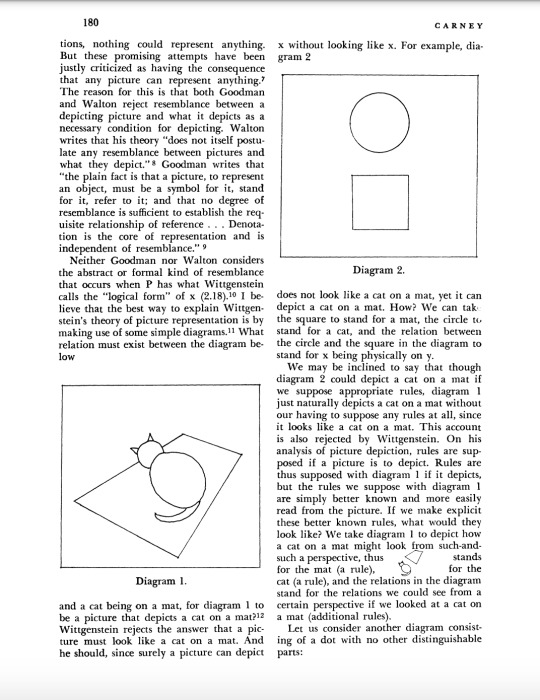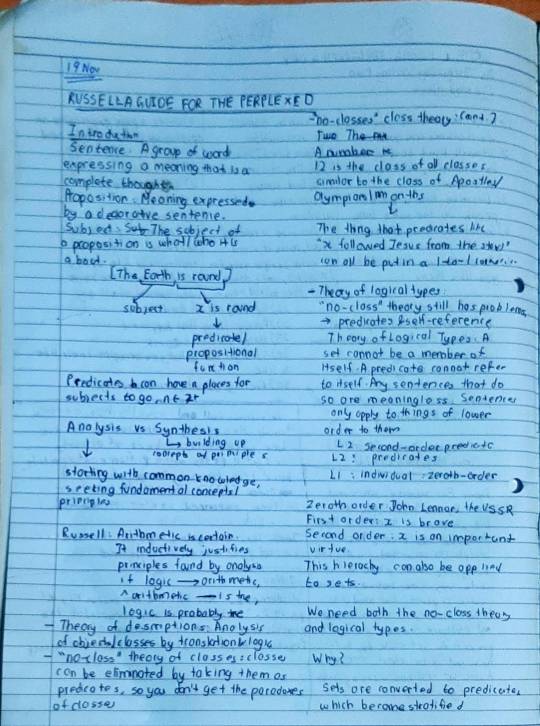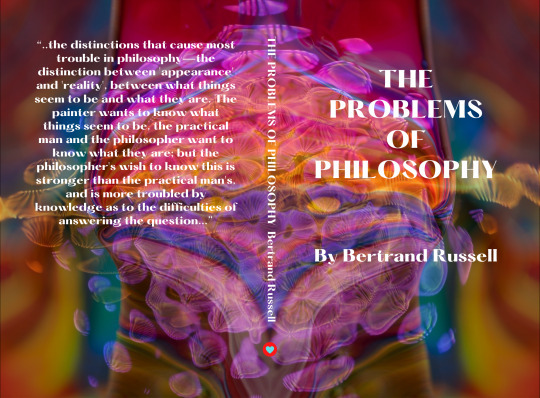#analytic philosophy
Text

Seen on Facebook. Seems on point. Though, TBF, what do I even know? I’m just a former future philosopher.
#philosophy#continental philosophy#analytic philosophy#this is a shitpost#please don’t freak out#I’m truly sorry#funposting#eliza.txt
14 notes
·
View notes
Text

when you remember that whereof one cannot speak, thereof one must be silent
#me everyday unironically#he would absolutely despise me#ludwig wittgenstein#Wittgenstein#analytic philosophy#philosophy memes#philosphy meme#academia#20th century philosophy#philosophy of language#bertrand russell#dark academia#3 am thoughts#tractatus logico philosophicus
43 notes
·
View notes
Text
Delving into the Depths of Thought: A Review of "The Problems of Philosophy" by Bertrand Russell

Bertrand Russell's "The Problems of Philosophy" stands as a timeless exploration of some of the most fundamental questions that have puzzled humanity for centuries. In this concise yet profound work, Russell embarks on a journey to unravel the mysteries of existence, knowledge, and reality, offering readers a thought-provoking introduction to the field of philosophy.
At the heart of Russell's inquiry lies the quest for knowledge and understanding. Through clear and accessible prose, he tackles age-old questions such as the nature of reality, the existence of an external world, and the limits of human perception. Drawing on insights from logic, mathematics, and the natural sciences, Russell challenges readers to critically examine their assumptions and beliefs, encouraging them to engage in rational inquiry and intellectual curiosity.
One of the key strengths of "The Problems of Philosophy" is Russell's ability to distill complex philosophical concepts into digestible and engaging discussions. Whether discussing the nature of space and time, the concept of truth, or the problem of induction, Russell presents ideas with clarity and precision, making them accessible to readers of all backgrounds. His use of concrete examples and thought experiments helps to illuminate abstract concepts, allowing readers to grasp the underlying principles more easily.
Moreover, Russell's work is not merely an intellectual exercise but also a call to action. Throughout the book, he emphasizes the importance of critical thinking and skepticism, urging readers to question authority and think for themselves. By encouraging a spirit of open-minded inquiry, Russell empowers readers to challenge received wisdom and explore alternative perspectives, fostering intellectual independence and freedom of thought.
In addition to its philosophical insights, "The Problems of Philosophy" also offers a historical perspective on the development of philosophical thought. Russell traces the evolution of philosophical ideas from ancient times to the modern era, highlighting key figures and movements that have shaped the discipline. By situating philosophical problems within their historical context, Russell provides readers with a deeper appreciation for the ongoing dialogue that has characterized philosophical inquiry throughout history.
Overall, "The Problems of Philosophy" is a timeless classic that continues to inspire and provoke readers with its profound insights and thought-provoking questions. Russell's lucid prose, rigorous analysis, and commitment to intellectual honesty make this book a must-read for anyone interested in philosophy, logic, or the pursuit of knowledge. In a world filled with uncertainty and confusion, Russell's work serves as a beacon of clarity and reason, guiding readers on a journey of philosophical discovery and self-reflection.
Bertrand Russell's "The Problems of Philosophy" is available in Amazon in paperback 12.99$ and hardcover 18.99$ editions.
Number of pages: 146
Language: English
Rating: 9/10
Link of the book!
Review By: King's Cat
#The Problems of Philosophy#Bertrand Russell#Philosophy#Epistemology#Metaphysics#Logic#Rational inquiry#Skepticism#Knowledge#Reality#Perception#Truth#Existence#Mind-body problem#Perception vs reality#Empiricism#Rationalism#Skeptical doubt#Critical thinking#Analytic philosophy#Conceptual analysis#Idealism#Materialism#Phenomenology#Pragmatism#Abstract concepts#Thought experiments#Epistemic justification#Philosophy of language#Philosophy of science
3 notes
·
View notes
Text
Intuition is a perception by ways or means of the unconscious.
Carl G. Jung, Interviews.
#philosophy tumblr#philoblr#analytic philosophy#analytic psychology#psychoanalysis#philosopher#psychologist#carl jung#depth psychology#perception#intuition#unconscious#consciousness#dark academia#life quotes
15 notes
·
View notes
Conversation
Wittgenstein:
Ramsey:
Wittgenstein:
Ramsey:
Wittgenstein: ...
Wittgenstein: okay.
#philosophy#incorrect philosophy#philosophy shitpost#wittgenstein#frank ramsey#ludwig wittgenstein#philosophy of language#analytic philosophy
17 notes
·
View notes
Photo

- James D. Carney, “Wittgenstein's Theory of Picture Representation,” The Journal of Aesthetics and Art Criticism, Volume 40, Issue 2, 1981
#Wittgenstein#ludwig wittgenstein#James D. Carney#picture representation#cats#cats on mats#the cat sat on the mat#philosophy#analytic philosophy#diagrams#resemblance#representation#symbols#cat philosophy#cats and philosophy#philosophy and cats#philosophy of cats#mat philosophy#mats and philosophy#philosophy and mats#philosophy of mats#aesthetics#art criticism#The Journal of Aesthetics and Art Criticism
4 notes
·
View notes
Text

3 notes
·
View notes
Photo

When I was fresh out of school, very shortly after I finished my IB exams - it was a sign that I could release my pent-up demand for reading, something that I had kept plugged in the months leading up to my IBs. I borrowed a lot of books from the library in the first few weeks after my exams, most of them being science-fiction, Marvel/DC comics, and the very occasional math/physics book that wasn’t just your average pop-science dreck. But I’d been bitten by the philosophy bug, and one of my first serious pieces of reading was an introduction to Bertrand Russell’s thought. I took copious notes between 19 and 23 November, 2020. I was initially planning on covering all the chapters, from logic to metaphysics and epistemology, but I lost steam after covering Russell’s and Whitehead’s Principia Mathematica, and their developments in logic.
Here’s my first page of notes on Russell and Whitehead’s “no-classes” theory of classes, which I think also serves as a good introduction to first-order logic. It’s definitely insightful, as the set theory taught in school, I’m afraid to say, seems to mostly consist of Venn diagrams and word problems, which in the end has little truly mathematical content, and therefore goes into the theory of sets in a very naive way (e.g without going into Russell’s paradox, etc.). I’ll be posting more on the Principia Mathematica in the coming days, together with notes entwined with my own readings in later philosophy of mathematics and logic.
#mathematics#logic#mathblr#studyblr#philosophy#analytic philosophy#bertrand russell#afred north whitehead
3 notes
·
View notes
Text

#daniel dennett#philosophy memes#philosophy of mind#analytic philosophy#behaviorism#psychology#computationalism#philosophy#new atheism
3 notes
·
View notes
Text
Stuck in the middle
We can't quite see the amenities of life. Why, I completely fucked up writing again. Nevertheless, there will be information and facts for the free man, the man of dignity. And here we will see the eventual collision of dreams.
As we plough through life, there is a frankly miniscule area of nonsense that we may have to get used to, to see through the endless cascade of myriad phenomena. In a game of chess, we experience moments of glory, incidents of greatness and sequences of cleverness. Sometimes we can wonder for what reason there is indeed so little to say at distinct times. It seems there is never an occasion to speak; or failing that, it doesn't seem worth it to say anything. In that paradigm, chess changes a factor. People are involved in a story in which the idea is ever the same, but the finesse is ever different. We see, in a game of chess there are a degree of life-lessons. The analysis, the concentration, the art of chess-playing is verily a fountain of inspirations, of salvations. On the other hand, it is just a game. Our attention goes out to an entirely artificial system which has no real-world connection. I like chess, as a sport, because it is very intelligent and has a lot of unexpected depth to it. But the thing is, we all do things, but there ain't no total meaning to work: we're all just stuck in mediocrity, and there is no way forward in the foundations of simple work. We try to live in a direct and logical way, but the liberation from life only comes when we livingly move into great stuff. Everything is stupid, but we try to stand up and come on, so that we perhaps don't need to play chess - in truth, there is not exclusivity to our daily routines, but verily just an infinite cascade of clever plans to make life a little bit better: and this is work, philosophy, heaven, Earth, command and discipline.
The words of The Netherlands are: I shall maintain, je maintiendrai in French. These legendary words come from the Protestant war hero William the Silent. In my opinion, he is an inspiring figure, but his struggle - possible the purest of all Christian struggles - stands out in its emptiness. In William's time, people breathed religion. It really was just a way of life. But the dramatic and subtle constructions of the Protestant theologians fall into dust when seen in the light of the Dutch rebellion. What was it all about? After William's death, The Netherlands developed into a prosperous and refined nation, with high quality art and great maritime and economic power. Did religion contribute in any way to this? People speak of the Calvinist work ethic; it seems people really did try to come into a closer, deeper relationship with God, but the enterprise of church society also shows that there was little to no concreteness to the articulations of the reformers. In many ways, this really is the true birth of realpolitik. Released from Catholic ritualism, the Protestants were free to focus on the task at hand and make an effort to institute a wordly state, one governed not by classes of monks and knights, but solely by administrators and stewards. Although there was still a lot of confusion, or one might say traditionalism, these stages betray the erection of an objective, impartial government.
I suppose this is all very unusual. The sounds of reform cannot be found in the normal straights of vehement logic and happiness; however, there is a chime of uprightness in the viccissitude of magnanimous life, which is full of eventful happenings: yet these strange affairs do not amount to anything substantive: the comings and goings of being stuck in madness sends us maniacally into the mystical territory of colonialism and veritable simplicity, just a conniving subset of menial attractions, but the constancy of meaning supports us in our combat versus the infidels, and there is much to be thankful for. In fact, the mania of systematicity is a fact, as everything is collected in information, and so although our lives are hollowed out the truth is suddenly re-envisioned in uprightness.
Contemplating the meaning of life is probably the most general act of thinking, or being, that we can do. Is it also the most futile? In a great many ways, thinking about the meaning of life relies on definite practical insights that occupy our mind and which mark our life. However, freedom lies in finding truth in details or occurrences. Language spoken can populate our existence with notions, with meditations, with reason. Obviously, human nature is to inquire penetratingly into the practical aspect of words, namely what it requires from us. At the same time, society depends on titbits. The purpose of the essay is certainly to treat of titbits, so as to make people enjoy them, or our of necessity. Information, facts, are found in scientific and scholastic disputations, but also, in humanistic collequy. And then you will say, what's the worth of base talk? Of deliberation? To do the not-doing, to clear one's mind, to become aware of the invisible creatures inhabiting our cells. I don't know. Life is an endlessly uphill journey. All we can do, is dissappear and reappear, come and go, live and let live. Happiness, true happiness, is winding down from tension - asserting non-assertion: wo go forth and multiply, yet we love each other. There is much to learn.
The value of a job is that you do meaningful things in a relaxed and organized fashion, but there is also the simple of process of dealing with the fall-out of determined fighting.Vincent van Gogh typified the human soul as a fighter, or contender. Verily, there is a fight going on, and things explode from time to time, leaving us without means. But there is a way of peace, of stalwardness, that nevertheless gives us the chance to prove ourselves. What can we do? Verily, what is lacking in life is people's appreciation of pretty conviviality, of synergy; we wish to move collectively to a higher goal; we like a unity of mind, togetherness, also freedom, that there may be work without responsibility, kindness without entrepeneurship. Why, what I find most appealing about contemporary society is truly the office space, with optimistic men and women showing up to work out problems, and tell the truth about a great manner of things. The things that mark our life are ever found in the catalysis, refining the mad grandeur of motif sorts of creative enterprise, because our desire remains to set forth subtle and invigorating philosophy and pay proper, sensible respect to the supernatural powers, to the factual anbd informational things. Certainly, a belief in God is sometimes a matter of course, a method through which we may recognize the possibiliy of answers - and we observe that conversations convey only the absurdity of God, or the im-possibility of religious guidance, religion. We see that there will be indeed a liberty in ministry, a lack of recognition where there is culture, indeed the solitariness of culture. So my positions stays that the world is destroying itself for no reason, liberties hold out against the horror and beauty of culture, everything returns to the same place. Our task is not to change the world, but to agree with it.
Potentially, that is all reverberating strangeness, but the hope of life will support our industry till the end, when there will be gnashing of teeth et cetera. However, our support does go forth into freedom; happiness continues to brighten our day; and freedom can give us respite in the last analysis.
#talking#art#existentialism#je maintiendrai#calvinism#Dutch golden age#parliamentary democracy#Schopenhauer#montaigne#star wars#van gogh#analytic philosophy#theology#democracy
0 notes
Text

#no regrets#philosophy#philoblr#continental philosophy#studyblr#analytic philosophy#eliza.txt#funposting#from twitter
49 notes
·
View notes
Text
I really feel for Bertrand Russell, being Wittgenstein’s teacher must have been traumatizing
#frege really saw Wittgenstein and was like nah i am not doing that let’s send him to Russell#and i mean Russell loved him but also Wittgenstein was insufferable#ludwig wittgenstein#Wittgenstein#bertrand russell#analytic philosophy#20th century philosophy#philosophy shitpost#philosophy#philosophy memes#dark academia#academia
38 notes
·
View notes
Text
Delving into the Depths of Thought: A Review of "The Problems of Philosophy" by Bertrand Russell

Bertrand Russell's "The Problems of Philosophy" stands as a timeless exploration of some of the most fundamental questions that have puzzled humanity for centuries. In this concise yet profound work, Russell embarks on a journey to unravel the mysteries of existence, knowledge, and reality, offering readers a thought-provoking introduction to the field of philosophy.
At the heart of Russell's inquiry lies the quest for knowledge and understanding. Through clear and accessible prose, he tackles age-old questions such as the nature of reality, the existence of an external world, and the limits of human perception. Drawing on insights from logic, mathematics, and the natural sciences, Russell challenges readers to critically examine their assumptions and beliefs, encouraging them to engage in rational inquiry and intellectual curiosity.
One of the key strengths of "The Problems of Philosophy" is Russell's ability to distill complex philosophical concepts into digestible and engaging discussions. Whether discussing the nature of space and time, the concept of truth, or the problem of induction, Russell presents ideas with clarity and precision, making them accessible to readers of all backgrounds. His use of concrete examples and thought experiments helps to illuminate abstract concepts, allowing readers to grasp the underlying principles more easily.
Moreover, Russell's work is not merely an intellectual exercise but also a call to action. Throughout the book, he emphasizes the importance of critical thinking and skepticism, urging readers to question authority and think for themselves. By encouraging a spirit of open-minded inquiry, Russell empowers readers to challenge received wisdom and explore alternative perspectives, fostering intellectual independence and freedom of thought.
In addition to its philosophical insights, "The Problems of Philosophy" also offers a historical perspective on the development of philosophical thought. Russell traces the evolution of philosophical ideas from ancient times to the modern era, highlighting key figures and movements that have shaped the discipline. By situating philosophical problems within their historical context, Russell provides readers with a deeper appreciation for the ongoing dialogue that has characterized philosophical inquiry throughout history.
Overall, "The Problems of Philosophy" is a timeless classic that continues to inspire and provoke readers with its profound insights and thought-provoking questions. Russell's lucid prose, rigorous analysis, and commitment to intellectual honesty make this book a must-read for anyone interested in philosophy, logic, or the pursuit of knowledge. In a world filled with uncertainty and confusion, Russell's work serves as a beacon of clarity and reason, guiding readers on a journey of philosophical discovery and self-reflection.
Bertrand Russell's "The Problems of Philosophy" is available in Amazon in paperback 12.99$ and hardcover 18.99$ editions.
Number of pages: 146
Language: English
Rating: 9/10
Link of the book!
Review By: King's Cat
#The Problems of Philosophy#Bertrand Russell#Philosophy#Epistemology#Metaphysics#Logic#Rational inquiry#Skepticism#Knowledge#Reality#Perception#Truth#Existence#Mind-body problem#Perception vs reality#Empiricism#Rationalism#Skeptical doubt#Critical thinking#Analytic philosophy#Conceptual analysis#Idealism#Materialism#Phenomenology#Pragmatism#Abstract concepts#Thought experiments#Epistemic justification#Philosophy of language#Philosophy of science
0 notes
Text
Language is the house of Being.
Martin Heidegger, Source Unlisted.
#philosophy tumblr#philoblr#german philology#philosopher#heidegger#analytic philosophy#language#dasein#being and nothingness#linguistics#dark academia#life quotes
44 notes
·
View notes
Conversation
*on a cycle of every couple hundred years or so*
philosopher: look at this new shiny thing I made!
philosopher:
philosopher: sorry turns out that was copyrighted by the Greeks. also it doesn't work
philosopher: so I think we should all give up, actually. who needs to think lol
philosopher:
philosopher: okay but actually-
*rinse and repeat*
#philosophy#incorrect philosophy#fake philosophy#philosophy shitpost#they're all awful do they ever do anything#analytic philosophy
10 notes
·
View notes
Text
Audio of my Whitehead Conference presentation at Munich School of Philosophy
This talk was delivered on July 29th, 2023 at 4:30pm at the Munich School of Philosophy. Thanks to Godehard Brüntrup for chairing the session. You can find the paper I am summarizing here: “Whitehead’s Philosophy of Organism: Turning Idealism Inside Out“
youtube
View On WordPress
1 note
·
View note